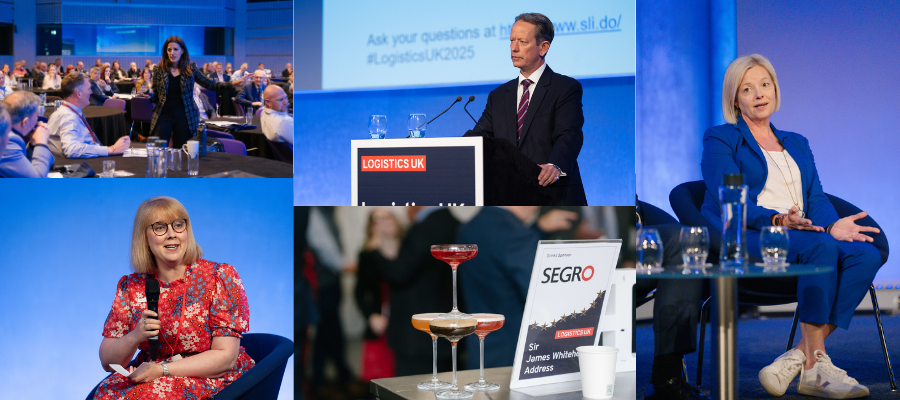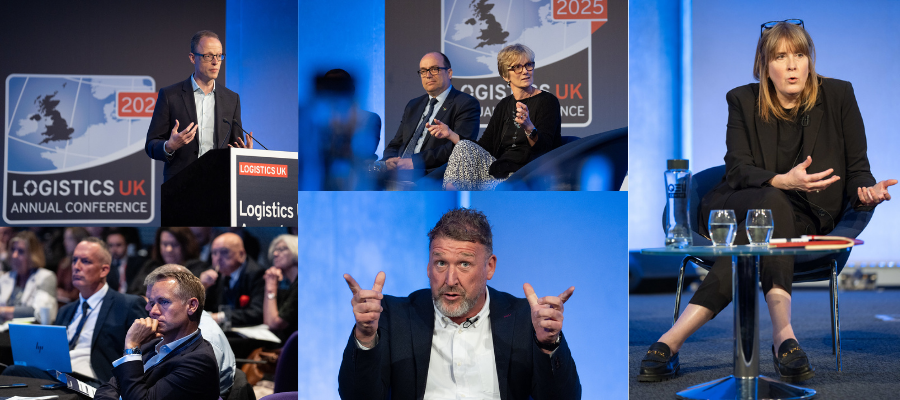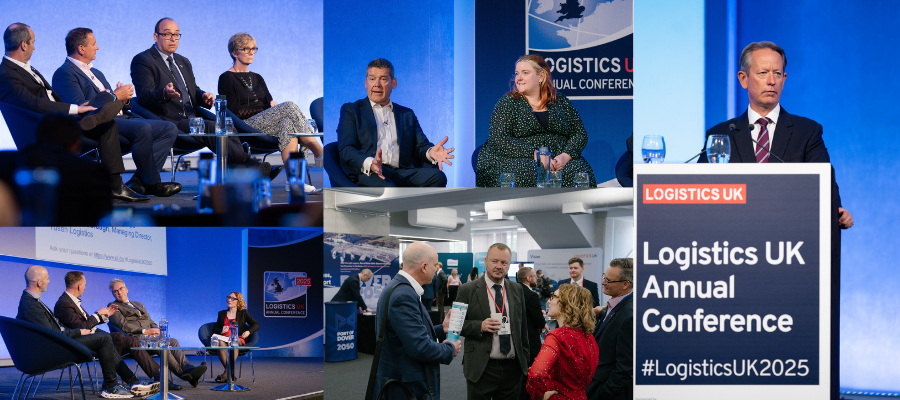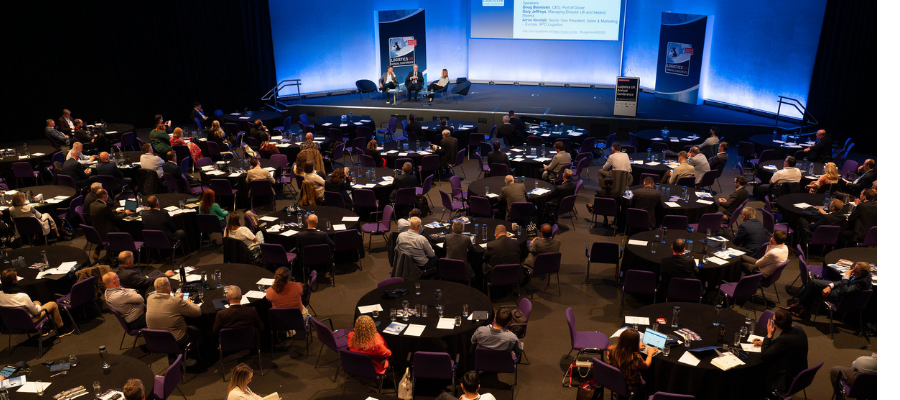🕒 Article read time: 2 minutes
The inaugural Logistics UK Annual Conference 2025 - it was quite a day...

The inaugural Logistics UK Annual Conference took place on Wednesday 4 June at the Queen Elizabeth II Conference Centre in Westminster.
Attended by over 250 senior delegates from the UK’s logistics sector, the event saw the launch of the Logistics UK Logistics Report 2025, its annual review of the sector which shows logistics generates £170 billion for the UK economy, employs over 8% of the nation’s workforce and will be a key enabler in the government achieving its growth agenda.
A host of top line speakers gathered to mark the Conference. Minister for the Future of Roads Lilian Greenwood hailed logistics as an "unstoppable force for economic growth" in her keynote, and that the UK logistics sector “lies at the heart of government’s plan for change”.

In her speech, Ms Greenwood recognised that the “industry wants more clarity from government” and stressed that “logistics lies at the heart of government’s plan for change”, saying that it is “ready to work with the sector every step of the way.”
Logistics UK President Phil Roe opened the event by outlining the critical contribution the industry makes to the UK economy: “Logistics is not a background operation,” he said, “it is a driver of growth and a barometer of economic efficiency. When logistics thrives, the economy thrives.
Other speakers included Minister of State for Industry Sarah Jones who described the logistics sector as the "powerhouse" of the UK, while Shadow Transport Secretary Gareth Bacon MP referred to the sector as an "invisible but essential thread that keeps the engine of our economy functioning".

The impressive line- up of speakers and panellists kept coming: Professor of Logistics at Kuehne Logistics University Professor Alan McKinnon and Mike Garratt, Chairman of MDS Transport discussed issues under the title “Economic outlook for the sector: navigating the future”.
The role of logistics amid the environmental crisis took centre stage in discussions, with Professor McKinnon proposing the label “climate logistics” as the collective term for the multiple roles that logistics will play in this battle.
Professor McKinnon said: "In a paper I wrote for Logistics magazine's decarbonisation sister title The Green Miles, I outline its scope and its relevance to users and providers of logistics services. There is no question that logistics is a major cause of climate change.
"Globally, it is responsible for around 12% of energy-related CO2 emissions, roughly 85% of which comes from freight transport, the rest mainly from storage and handling operations. When you factor into the calculation emissions of other greenhouse gases (GHGs), such as methane, refrigerant gases and black carbon, all with global warming potentials much higher than CO2, and express the transport CO2 figures on a ‘well-to-wheel’ rather than ‘tank-to-wheel’ basis, the estimate of logistics’ contribution to climate change is substantially inflated.

"For logistics to achieve net zero targets by 2050 or sooner, the average carbon intensity of freight transport will have to drop by a much greater margin and more rapidly to compensate for this extra freight movement. This will be a very formidable task.
"In recognition of the magnitude of this task, perhaps ‘climate logistics’ activities could be given longer to reach net zero targets and/or awarded special carbon credits for the key roles they will play in the existential struggle to keep our planet habitable."
“'At the heart of UK industry and growth” was chaired by Logistics UK's Policy and Communications Director Kevin Green and featured speakers Maggie Simpson OBE (Director General, Rail Freight Group), Nigel Milton (Chief Communications and Sustainability Officer, Heathrow Airport), Saul Resnick (CEO UK&I, DHL Supply Chain) and John Trenchard (Vice President for Commercial & Supply Chain, DP World).

A lively discussion saw differing views on the potential third runway at Heathrow. The panel also discussed the World Bank's latest statistics which showed that, in the world league table of logistics efficiency, the UK had fallen from fourth to 19th between 2020 and 2025, largely due to border friction and a lack of investment.
Overall, there was a broad sense of frustration at the lack of government focus on freight in their first year in power, whilst the panel welcomed Lilian Greenwood's pledge - earlier in the conference - to work with logistics in order to help grow the economy.
Sustainable Aviation Fuel (SAF) was also discussed at some length, with Heathrow's Nigel Milton revealing that there is much still to be done in this area as, while the airport's SAF usage was the largest of any airport in the world, it still represented only 2% of overall usage.
Shadow Transport Secretary Gareth Bacon MP used his speaking opportunity to assure delegates that he is very keen to "listen" to logistics businesses to help build an efficient and prosperous sector in the future.
Addressing the conference, Mr Bacon, the MP for Orpington, said: "With a history stretching back well over a century, Logistics UK is the only business group to represent the whole of the logistics sector. Your voice matters. Policymakers who do not listen to it are setting themselves up to fail.
"Logistics is an invisible but essential thread that keeps the engine of our economy functioning. The opportunity (that logistics affords to industry) we can't afford to waste and yet, and I say this with regret - for a long time, the UK has not been going in the right direction.
"I've not yet had the opportunity to study The Logistics Report in detail, but I have seen the headlines and some of these are encouraging in some respects. Despite challenges, businesses continue to invest in new fleets and new technologies which augurs well for the future. But there are real warning signs that we cannot ignore.
"What you - the delegates in this room - think matters. Our job is to try to translate that thinking into deliverable policy. So that's our pledge to you now. That's why I'm here today, because that's got to be the basis of how we approach this. If we try to do this, just relying on ourselves, we can get it wrong. So, the offer, I suppose, is to listen to as many of you as possible."

Sarah Jones MP, Minister for Industry. In a wide-ranging address, the Minister described logistics as “a powerhouse” recognising the importance of the sector to the whole economy saying that logistics “needs to be the thread that runs through all government strategies.”
With growth and job creation a top priority for the government, the Minister said that it was important for logistics to be considered in all areas of policy decisions, even suggesting that logistics could determine the overall success of the government.
Noting that the sector spans the responsibilities of multiple departments, the Minister recognised that navigation through government can be challenging but still stressed the importance of a partnership approach between government and industry: “The logistics industry needs to challenge the government, and government needs to challenge the logistics sector,” she said.
One of the highlights of the day was Priya Lakhani OBE, CEO of Century Tech's talk on how AI change can the face of the industry. You could hear a pin drop in the auditorium while Lakhani OBE, delivered an inspirational insight into the world of AI and the threats and opportunities the technology presents.
With plenty of audience participation Ms Lakhani dispelled some of the hype surrounding AI but showed how when used appropriately it can be transformational.

“Unlocking Trade to Connect the UK to World Markets” was chaired by Logistics UK Head of Trade and Devolved Policy Nichola Mallon. She was joined on stage by Port of Dover’s CEO UK&I Doug Bannister; Maersk’s Managing Director UK and Ireland Gary Jeffreys, and XPO Logistics’ Senior Vice President, Sales & Marketing – Europe, Arron Kendall.
Opening the discussion, Ms Mallon noted that “trade likes simplicity and certainty” but the changing landscape of trade tariffs is generating significant volatility. Mr Jeffreys emphasized this point highlighting how the US/ China trade tariffs have led to a 40% reduction of container shipments from China to the US. Mr Jeffreys also noted how China is moving more goods to Europe – something that could lead to port congestion in the next few months as China develops new markets.
Looking to the future, the panel noted that innovation and technology will be key to optimising infrastructure and new technology will enable improved traffic flow at borders while maintaining security.
And with new trade deals on the horizon, the message from the panel was clear: now is the time to deliver on these opportunities and ensure the deals come to fruition.
More Conference highlights to come over the coming weeks...
Published On: 12/06/2025 16:24:09

Comments Section
If you are a Logistics UK member login to add comments.